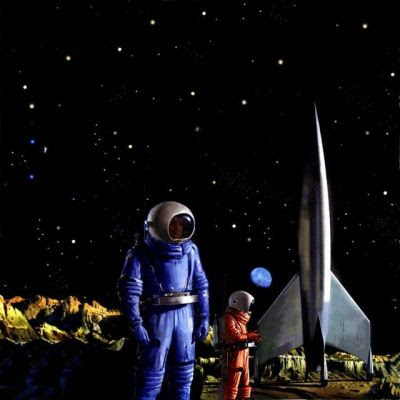If not for the box-office success of "Destination Moon", which marks its 70th anniversary release on June 27, it's unlikely that filmmaker George Pal would have been allowed to make "When World Collide", "Conquest of Space", "The War of the Worlds" and "The Time Machine", to name but a few. ("Destination Moon'"s avid, publicity campaign alone was enough to prompt the cult favorite, "Rocketship XM" into production.) Even so, modern snobbery downplays "Destination Moon'"s impact. Why?
"Destination Moon" does, after all, offer an engaging pace, thanks to director Irving Pichel (who portrayed Sandor in "Dracula's Daughter", no less); a persuasive script by James O'Hanlon, Rip Van Ronkel and Robert A. Heinlein (who lifted the premise from his novel, "Rocket Ship Galileo"); striking, Technicolor cinematography by Lionel Lindon; exquisite special effects by Lee Zavitz (for which he won an Oscar); masterful art direction by Ernst Fegte and George Sawley (also Oscar winners); a stirring score by Leith Stevens; and marvelous matte paintings by the legendary Chesley Bonestell.
To boot, its cast ideally matches its aforementioned attributes and includes such faithful faces as John "King of the Zombies" Archer; Warner Anderson; Tom Powers; Dick Wesson; and Erin O'Brien-Moore. Woody Woodpecker's instructive cameo doesn't hurt, either, especially when accompanied by Pichel's amiable narration.
To a large degree, the reluctance to grant "Destination Moon" the credit it deserves stems from its perceived, inaccurate and/or dated scientific seasonings, particularly when compared to the 1969 Lunar Landing, as well as the recent likes of SpaceX and Elon Musk's related, astral ambitions. However, this position proves weak, for "Destination Moon" supplies a sturdy, alternate-reality (Wright Brothers in orbit) precursor to such industrious avenues and is more in tune with them than some might choose to confess.
To plug any scientific "inaccuracies", the essayed, entrepreneurial excursion exudes oodles of melodramatic artistry and devotion. The movie is the unofficial blueprint for "2001: A Space Odyssey", while its plot is as captivating as that of "Forbidden Planet", "This Island Earth" or the creme de la creme of "Star Trek". Despite its fictional format, its suspense-building angle holds its own with "Apollo 13'"s.
Pal and his staff hit their prestigious pinnacle by investing imaginative finesse and sweat-of-the-brow drive into their vision: one that some claimed could not reach the screen to the convincing extent that it did.
Here's another matter to consider: Lazy and craven sorts (who seem more prevalent than ever) dismiss and/or dislike "Destination Moon" because it challenges them to take that diligent "giant leap" required to get a job done. Its haughty detractors are more apt to rest on their laurels and ridicule those who possess that righteous "right stuff". Without question, Pal and his valiant crew possessed just that.
Seven decades have passed since "Destination Moon'"s release, but for those wise enough to remember (respectful enough to care), it remains the proverbial, cinematic example of stellar achievement. This not only makes it a science-fiction triumph, but an aesthetic, American anthem. Only those of an un-American streak would state otherwise.
Indeed, one of open mind (and intrepid heart) can benefit from (re)visiting "Destination Moon". Unless one is the quivering, indolent sort, one is certain to come away impressed and even more so, inspired:
https://www.youtube.com/watch?v=8hIkU69-RBI.



















No comments:
Post a Comment